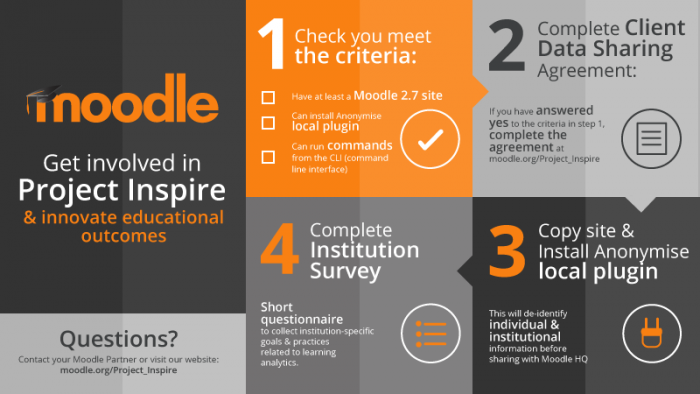If you were at MoodleMoot Australia 2016 in Perth last September, you would have heard the words “Project Inspire” and “Learning Analytics Tools” being mentioned a number of times.
You might have also watched one of the presentations or masterclasses conducted by Moodle HQ’s Research Analyst, Elizabeth Dalton, on what is Project Inspire, why we have this project, how it will work and what will we get out of it.
Moodle’s Project Inspire is essentially Moodle’s Analytics Plan. The project aims to identify and validate, indicators of student, teacher and institutional engagement in educational activities.
Information from this will be used to develop learning analytics software features, which will have these functions:
- Description of learning engagement and progress,
- Diagnosis of learning engagement and progress,
- Prediction of learning progress, and
- Prescription (recommendations) for improvement of learning progress.
So, imagine being able to use Learning Analytics tools in your Moodle sites to determine “best practices” for successful students and teachers, to identify and support participants struggling to meet expectations, to understand what elements help to make the most successful course designs.
Doesn’t that sound really, really exciting? Innovative and powerful tools to assist in advancing educational outcomes!
Moodle HQ is aiming to to have Project Inspire’s learning analytics tools as a separate plugin in the upcoming Moodle 3.3 release.
To make this happen, we need your help during phase 1 and 2 of Moodle Inspire’s research stage.
We talk to Moodle HQ’s Research Analyst, Elizabeth Dalton, a bit more about Project Inspire and how you can get involved to make this innovative learning analytics tools in Moodle sites.
Moodle HQ: Thanks Elizabeth for taking the time to sit down and talk to us about Project Inspire. Can we start with, how did Project Inspire come about or start for Moodle? What was or are the reasoning and objectives of the Project?
Elizabeth Dalton: Thanks for asking! I’ve been interested in learning analytics for several years and I’m doing my dissertation in this area for a PhD in Education.
When I teach online and work with others who teach, I often find myself wondering “is this approach working for these students?” or “Should I add another activity here?” I wanted to be able to make these decisions based on data, if possible.
I have a background in educational theory and instructional design, but not all teachers have that, and most teachers are so busy keeping up with their workload that they don’t have time to review dozens of previous courses to try to find “best practices” to improve their courses. And it can be hard to know which courses to look at, even if you have access to a lot of data. Every course seems to be different, but there are ways in which many of them are similar if you can look past the surface.
During this time, I’ve been in communication with a number of other Moodlers who have similar interests. I think everyone involved in education wants to try to use all available data to improve outcomes.
In 2015, I was involved with an ad-hoc group to try to define the needs for inclusion of learning analytics in a future version of Moodle. I also presented at the 2015 iMoot on preliminary tools to provide descriptive analytics that I developed for my employer at the time, Granite State College. I was invited to present about this research and the tools as a plenary speaker at the 2015 US Moot at the University of Minnesota, and the ad-hoc learning analytics group held a workshop at the same Moot.
The following year I presented again at the 2016 MoodleMoot US in Long Beach, CA, and I had some great discussions with Martin Dougiamas and other folks at Moodle HQ about how to move forward with these goals.
Martin asked if I was interested in working on this full-time. I think it took me all of two seconds to decide to accept. Since then, I’ve been working with David Monllaó, integrator at Moodle HQ, full-time to make this vision into a practical reality.
Moodle HQ: So, can you tell us a little bit about how Project Inspire’s research, data collection and other activities will actually result in learning analytics tools for Moodle Core?
Elizabeth Dalton: Project Inspire will use data in a Moodle site to make predictions about student success, but in order for those predictions to be accurate from day one, we need to analyse data from a wide range of sites to determine what “indicators” or learner actions will have the best predictive power. By gathering data from a wide variety of different types of institutions, we can develop tools that will tailor themselves to the institution type.
The overall goal is to be able to help learners be successful. That has a different meaning depending on the type of institution. For example, at a k-12 school or university, student success is often defined in terms of final grades, but in a technical or vocational setting, demonstration of defined competencies is often a more important goal.
We also know that different institutions have different ways in which they use Moodle. Some are delivering fully online courses, while others are using Moodle to provide support for face to face classes, or a blend of the two. Some courses take place during a fixed span of time, while others are self-paced. We believe there are indicators (data elements) that will work to predict success across these different institution types, but we need a large aggregation of data to develop the models that will take these different factors into account.
Moodle HQ: We know the end product – the learning analytics tools – is yet to be developed and implemented, and will continually be enhanced/improved. But can you describe what are some of the possibilities that such powerful and innovative tools can do for educators and learners?
Elizabeth Dalton: Wow, that’s a long list! What we are doing with Project Inspire is looking for the learner actions that lead to success, defined in the different ways I mentioned earlier, and then also looking for teacher actions, course design features, and even peer learning characteristics, like the size of the class or group within a course, that lead to success.
The first version, Phase I, will provide notifications to students to support their progress towards completing a course. In future versions, we anticipate being able to offer advice to teachers about interactions with students, and to course developers about course contents (whether or not the teachers are also the course developers).
We also want to offer advice to institution administrators about aspects of how courses are managed, for example, class size, course length, and instructional mode (online, face to face, or a blend). Again, these advisements will be based on a combination of the site’s own data and data from similar sites who contribute to our research.
One of our most important criteria is to be completely open about how predictions are made from the data. We are testing our assumptions about models of learning before we ship Phase I, but we also want all Moodle users to be able to see for themselves how these predictions are made and be able to give feedback to improve future predictions and advisements. We think it’s important that everyone in a learning community can trust a system like this to work for their benefit. We have to balance that openness with a need to protect the privacy of individuals. I think we have some really good strategies in that regard.
Moodle HQ: Ok so we’ve mentioned in our introduction that if these innovative learning analytics tools are to be made possible in Moodle Core, we need help from organisations, institutions and people using Moodle to participate in phase 1 of the project.
What does that involve or how can they get participate to be part of Moodle’s Project Inspire?
Elizabeth Dalton: Participating in Phase I means giving Moodle HQ a copy of a production Moodle site’s database, safely anonymised to protect individuals from disclosure. We’ve put together a set of tools to help this process, but the institution — or their hosting Partner, if they have one — will need to start by making a full copy of their Moodle site with at least a year of data.
The Anonymise tool we provide works on that copy, not on production, and it strips out everything that could identify individuals or institutions. From there, the institution needs to complete the Data Sharing Agreement and the Institution Site Survey, then bundle up the database with those two documents and send us the whole package. We’ll be providing a secure repository site to receive the data (to be announced shortly).
Even institutions who can’t participate in the data-gathering project in Phase I can still participate, of course! The Analyser plugin will ship concurrently with Moodle 3.3 (May 2017), and we hope many institutions will install it and try it out, and give us feedback to help improve it.
Thank you Elizabeth for taking the time to talk to us about Moodle’s Project Inspire.
We are excited to launch this project and would appreciate the involvement of many Moodle sites in Project Inspire.
As Elizabeth mentioned, to get involved:
- Contact your local Moodle Partner.
- Go to our website for all the information.
- Follow the step by step infographic below.

We look forward to your involvement in Moodle’s Project Inspire.



